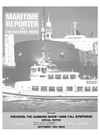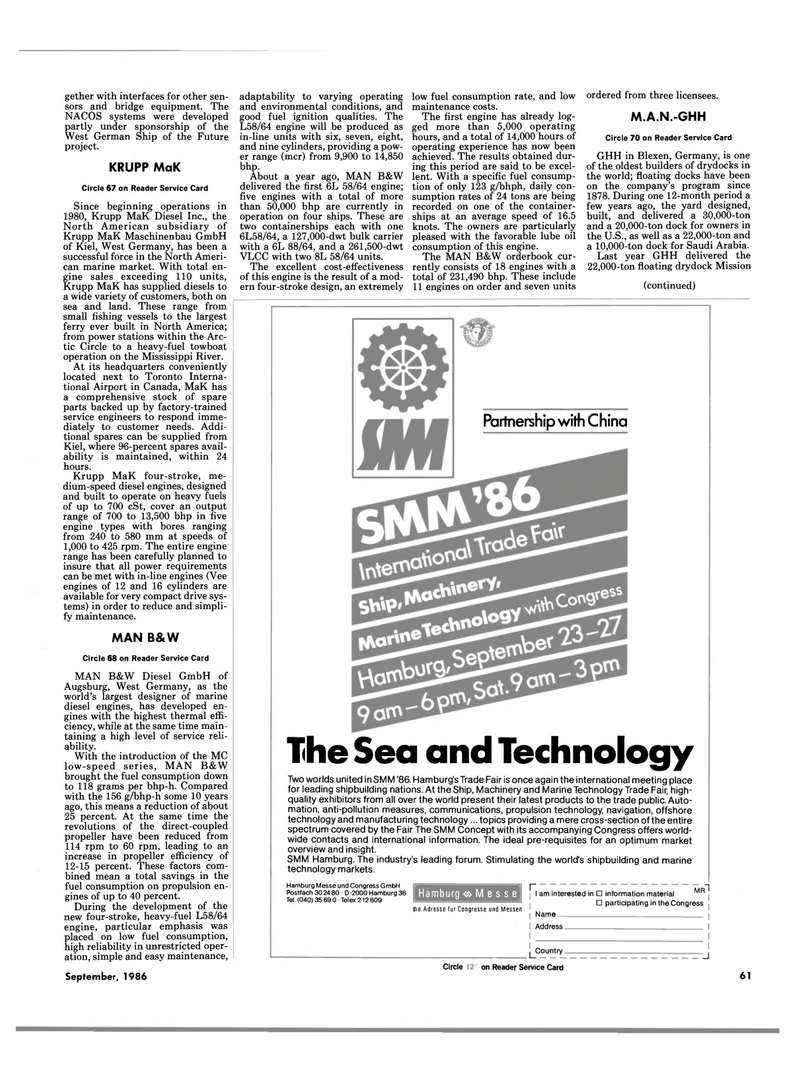
Page 59: of Maritime Reporter Magazine (September 1986)
Read this page in Pdf, Flash or Html5 edition of September 1986 Maritime Reporter Magazine
gether with interfaces for other sen- sors and bridge equipment. The
NACOS systems were developed partly under sponsorship of the
West German Ship of the Future project.
KRUPP MaK
Circle 67 on Reader Service Card
Since beginning operations in 1980, Krupp MaK Diesel Inc., the
North American subsidiary of
Krupp MaK Maschinenbau GmbH of Kiel, West Germany, has been a successful force in the North Ameri- can marine market. With total en- gine sales exceeding 110 units,
Krupp MaK has supplied diesels to a wide variety of customers, both on sea and land. These range from small fishing vessels to the largest ferry ever built in North America; from power stations within the Arc- tic Circle to a heavy-fuel towboat operation on the Mississippi River.
At its headquarters conveniently located next to Toronto Interna- tional Airport in Canada, MaK has a comprehensive stock of spare parts backed up by factory-trained service engineers to respond imme- diately to customer needs. Addi- tional spares can be supplied from
Kiel, where 96-percent spares avail- ability is maintained, within 24 hours.
Krupp MaK four-stroke, me- dium-speed diesel engines, designed and built to operate on heavy fuels of up to 700 cSt, cover an output range of 700 to 13,500 bhp in five engine types with bores ranging from 240 to 580 mm at speeds of 1,000 to 425 rpm. The entire engine range has been carefully planned to insure that all power requirements can be met with in-line engines (Vee engines of 12 and 16 cylinders are available for very compact drive sys- tems) in order to reduce and simpli- fy maintenance.
MAN B&W
Circle 68 on Reader Service Card
MAN B&W Diesel GmbH of
Augsburg, West Germany, as the world's largest designer of marine diesel engines, has developed en- gines with the highest thermal effi- ciency, while at the same time main- taining a high level of service reli- ability.
With the introduction of the MC low-speed series, MAN B&W brought the fuel consumption down to 118 grams per bhp-h. Compared with the 156 g/bhp-h some 10 years ago, this means a reduction of about 25 percent. At the same time the revolutions of the direct-coupled propeller have been reduced from 114 rpm to 60 rpm, leading to an increase in propeller efficiency of 12-15 percent. These factors com- bined mean a total savings in the fuel consumption on propulsion en- gines of up to 40 percent.
During the development of the new four-stroke, heavy-fuel L58/64 engine, particular emphasis was placed on low fuel consumption, high reliability in unrestricted oper- ation, simple and easy maintenance,
September, 1986 adaptability to varying operating and environmental conditions, and good fuel ignition qualities. The
L58/64 engine will be produced as in-line units with six, seven, eight, and nine cylinders, providing a pow- er range (mcr) from 9,900 to 14,850 bhp.
About a year ago, MAN B&W delivered the first 6L 58/64 engine; five engines with a total of more than 50,000 bhp are currently in operation on four ships. These are two containerships each with one 6L58/64, a 127,000-dwt bulk carrier with a 6L 88/64, and a 261,500-dwt
VLCC with two 8L 58/64 units.
The excellent cost-effectiveness of this engine is the result of a mod- ern four-stroke design, an extremely low fuel consumption rate, and low maintenance costs.
The first engine has already log- ged more than 5,000 operating hours, and a total of 14,000 hours of operating experience has now been achieved. The results obtained dur- ing this period are said to be excel- lent. With a specific fuel consump- tion of only 123 g/bhph, daily con- sumption rates of 24 tons are being recorded on one of the container- ships at an average speed of 16.5 knots. The owners are particularly pleased with the favorable lube oil consumption of this engine.
The MAN B&W orderbook cur- rently consists of 18 engines with a total of 231,490 bhp. These include 11 engines on order and seven units ordered from three licensees.
M.A.N.-GHH
Circle 70 on Reader Service Card
GHH in Blexen, Germany, is one of the oldest builders of drydocks in the world; floating docks have been on the company's program since 1878. During one 12-month period a few years ago, the yard designed, built, and delivered a 30,000-ton and a 20,000-ton dock for owners in the U.S., as well as a 22,000-ton and a 10,000-ton dock for Saudi Arabia.
Last year GHH delivered the 22,000-ton floating drydock Mission (continued)
Partnership with China
The Sea and Technology
Two worlds united in SMM '86. Hamburg's Trade Fair is once again the international meeting place for leading shipbuilding nations. At the Ship, Machinery and Marine Technology Trade Fair, high- quality exhibitors from all over the world present their latest products to the trade public. Auto- mation, anti-pollution measures, communications, propulsion technology, navigation, offshore technology and manufacturing technology... topics providing a mere cross-section of the entire spectrum covered by the Fair. The SMM Concept with its accompanying Congress offers world- wide contacts and international information. The ideal pre-requisites for an optimum market overview and insight.
SMM Hamburg. The industry's leading forum. Stimulating the world's shipbuilding and marine technology markets.
Hamburg Messe und Congress GmbH
Postfach 30 24 80 D-2000 Hamburg 36
Tel. (040) 35 69 0 Telex 212 609 Hamburg <$> M e s s e r die Adresse fur Congresse und Messen
MR~I I am interested in • information material • participating in the Congress
Name
Address . L Country. -J
Circle 305 on Reader Service Card 61

 58
58

 60
60
